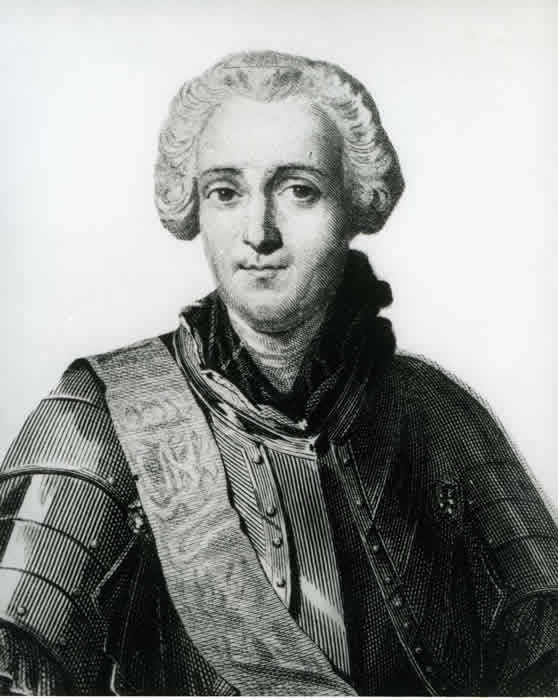

BATTLE OF THE PLAINS OF ABRAHAM
Québec Surrenders
Following the defeat of the Plains of Abraham, Governor Vaudreuil wondered how he should react. What should be the next move? His first reflex was to send a message to the dying Montcalm. Montcalm's answer was to suggest three options: immediately re-attack the enemy, regroup the troops upstream at the Jacques-Cartier River, or capitulate on behalf of the entire colony. Although he favoured the first option, the Governor was persuaded by his officers assembled at a council of war that it was best to regroup the troops around the Jacques-Cartier River. Vaudreuil sounded the retreat at 6:00 p.m. However, before doing so, he sent to the town commander Jean-Baptiste-Nicolas-Roch de Ramezay, the terms of the surrender that would have to be negotiated with the British127.
In the meantime, the Chevalier de Lévis learned the news and immediately left Montreal to rejoin the troops. The new commander of the French forces arrived at the Jacques-Cartier River on September 17. He then took control of the army in disarray. In his opinion, it had been a mistake to leave Québec, and he thought they should go back in order to avoid the worst: the capture of Québec by the British. If it turned out to be impossible to defend Québec, the town should be destroyed to prevent the enemy from spending the winter there. It was thus decided, and on September 18, the army began marching towards Québec. However, Lévis was too late.
On September 15, two days after the British had won a victory at the Plains of Abraham, and while they were preparing to lay siege to Québec, the Chevalier de Ramezay, commander of the town's garrison, convened his officers at a council of war. The pressure from residents to surrender the town was enormous. They had sustained heavy losses during the summer bombardments and they were morally and physically spent. Furthermore, this time the shellings would not come from the other side of the river but from the Plains, which was much closer. Finally, provisions were scarce and no one could see how the fortifications could withstand the siege128.
At the council of war, 13 of the 14 participants were in favour of surrendering the city. On September 17, around 3:00 p.m., de Ramezay therefore sent a messenger to the British with a capitulation proposal. It was signed on the morning of September 18.
Articles of the capitulation of Québec:
- Mr. de Ramsay demands the honours of war for his garrison, and that it shall be sent back to the army in safety, and by the shortest route, with arms, baggage, six pieces of brass cannon, two mortars or howitzers, and twelve rounds for each of them;
- That the inhabitants shall be preserved in the possession of their houses, goods, effects, and privileges, upon their laying down their arms;
- That the inhabitants shall not be accountable for having carried arms in the defence of the town, for as much as they were compelled to it, and that the inhabitants of the colonies, of both crowns, equally serve as Militia;
- That the effects of the absent officers and citizens shall not be touched;
- That the inhabitants shall not be removed, nor obliged to quit their houses, until their condition shall be settled by their Britannic, and most Christian, Majesties;
- That the exercise of the Catholic, Apostolic, and Roman religion shall be maintained; and that safeguards shall be granted to the houses of the clergy, and to the monasteries, particularly to his Lordship the Bishop of Québec, who, animated with zeal for religion, and charity for the people of his diocese, desires to reside in it constantly, to exercise, freely and with that decency which his character and the sacred offices of the Roman religion require, his episcopal authority in the town of Québec, whenever he shall think proper, until the possession of Canada shall be decided by a treaty between their most Christian and Britannic Majesties;
- That the artillery and warlike stores shall be faithfully given up, and that an inventory of them shall be made out;
- That the sick and wounded, the commissaries, Chaplains, Physicians, Surgeons, Apothecaries, and other people employed in the service of the hospitals, shall be treated conformably to the cartel of the 6th of February, 1759, settled between their most Christian and Britannic Majesties;
- That before delivering up the gate and the entrance of the town to the English troops, their General will be pleased to send some soldiers to be posted as safeguards upon the churches, convents, and principal habitations;
- That the King's Lieutenant, commanding in Québec, shall be permitted to send information to the Marquis de Vaudreuil, Governor-General, of the reduction of the place, as also that the General may send advice thereof to the French Ministry;
- That the present capitulation shall be executed according to its form and tenor, without being subject, to non-execution under pretence of reprisals, or for the non-execution of any preceding capitulation129.
It was while marching towards Québec that Lévis learned of the town's surrender. He had to turn back and return to the Jacques-Cartier River. Vaudreuil, for his part, continued on to Montreal where he spent the winter.

